Workbook questions Midterm
1/87
There's no tags or description
Looks like no tags are added yet.
Name | Mastery | Learn | Test | Matching | Spaced |
|---|
No study sessions yet.
88 Terms
Which principles, effects, or laws apply to decreased pressure with increased flow speed?
Bernouli’’s effect
Laminar flow is disrupted, and turbulence occurs when the Reynold’s number meets or exceeds what value?
2000
This equation: E (energy) = I (current) x R (resistance) is called _______ and is often used as an analogy to _________
Ohm’s law; Poiseuille’s law
The highest pressure in the arterial system is found in what region or organ?
Left ventricle of heart
Which of the following arterial wall structures is in direct contact with blood flow?
Endothelium
Perfusion in tissue is controlled by vasoconstriction and vasodilation in which of the following structures?
Arterioles
Which of the following is not a risk factor for peripheral arterial disease?
Venous insufficiency
Diabetes mellitus
Hypercholesteremia
Tobacco abuse
Venous Insufficiency
What is the most significant factor affecting diastolic blood flow in the lower extremities?
Vasoconstriction/dilation in the arterioles
The vasa vasorum supplies blood flow to what structure?
Arterial wall
Of the symptoms listed below, which is generally NOT associated with arterial insufficiency?
“Blue Toe” syndrome
Dependent rubor
Limb swelling
Rest pain in feet and toes
Limb swelling
Which of the following is another name for the internal iliac artery?
Hypogastric
What is the first major tibial artery branching off the distal popliteal artery?
Anterior tibial artery
What is the most common symptom of peripheral arterial disease?
Claudication
Thromboangiitis obliterans is a fixed occlusive disease of the digits. What is another name for this condition?
Buerger’s disease
The “blue toe” syndrome is a symptom of what condition?
Atheroemboli
Which artery supplies the most blood to the gluteus maximus muscle?
Hypogastric artery
What vessel brings blood to the left atrium?
Pulmonary vein
Increased hematocrit affects what aspect of blood flow?
Viscosity
According to Poiseuille’s Law, a change in which of the following factors has the greatest effect on flow?
Vessel radius
The cross-sectional area of a vessel can affect flow resistance. What vessel(s) has the largest total cross-sectional area?
Capillaries
Patients with ischemic “night pain” in their feet or toes often get relief by sitting up and hanging their feet off the bed. What hemodynamic factors are in play that reduces or elimiate the pain?
Hydrostatic pressure
What CFA waveform characteristic would suggest significant aorto-iliac disease?
Delayed rise time
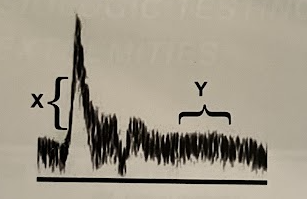
Which of the following statements best describes the flow profiles at “X” and “Y” in this spectral Doppler waveform
X is plug flow, Y is parabolic flow
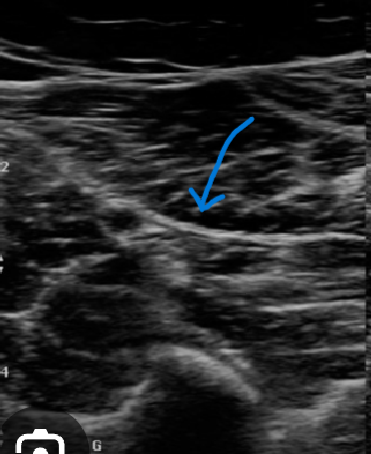
Is the soleal muscle above or below the echogenic line?
Below
When obtaining ankle blood pressures, what is the primary reason for having the patient flat in a supine position?
Reduce/eliminate hydrostatic pressure
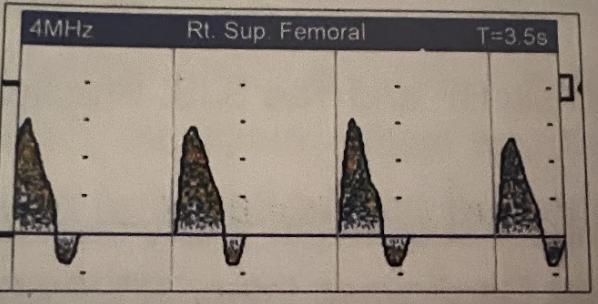
Based on the new waveform nomenclature system, what is appropriate name for this femoral waveform?
Multiphasic
Which of the following ABIs is most consistent with ischemic rest pain?
0.3
0.5
0.8
1
0.3
Which of the following conditions would cause an abnormal pulse volume recording (PVR) at the high-thigh location?
Significant aorto-iliac disease
The reported advantage of a four-cuff segmental pressure test over a three-cuff method is differentiating which of the following of these diseased segments?
Aortoiliac from femoral artery disease
Photoplethysmography uses which of the following modalities for blood flow evaluation?
Infrared
Which of the following lower arterial test modalities provides diagnostic quantitative information?
Segmental pressures
For accurate blood pressure determination, the cuff bladder should be ____ of the limb circumference
40%
Pulse volume recording is a form of which of the following methods?
Pneumo-plethysmography
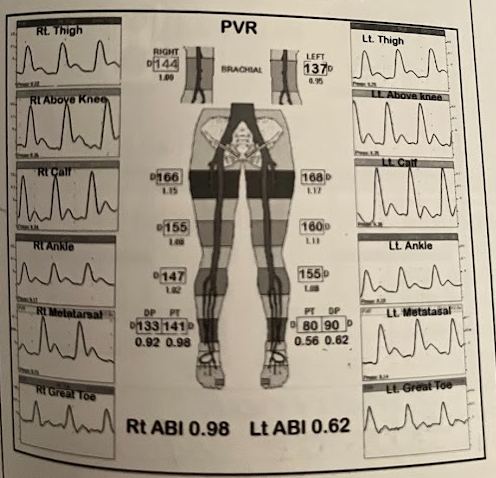
Please review this PVR and segmental pressure study and select an appropriate comment below
The left ankle pressure is probably erroneous
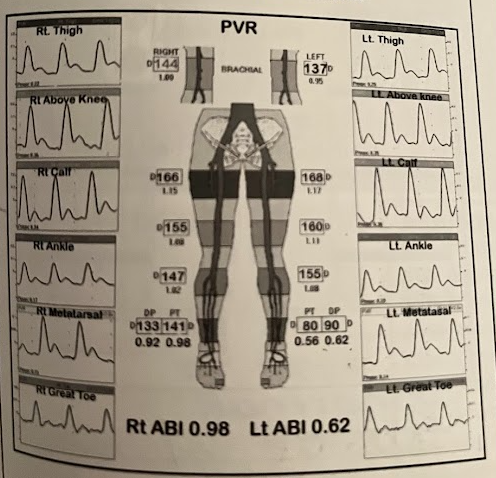
In this image, how is the ABI calculated?
Both right and left ankle pressures are divided by the highest brachial pressure
While performing segmental pressures on a lower extremity, you note a pressure gradient between adjacent two cuffs to equal 15mmHg. What does this finding indicate?
Normal result, no big deal
Leg pain with exercise that is not due to arterial occlusive disease is often referred to as:
Pseudo-claudication
Which of the following is a disadvantage of photoplethysmography compared to CW-Doppler in segmental pressure acquisition?
PPG cannot be heard
The DPA is a continuation of which vessel?
ATA
Which of the following is the single most important feature that defines a normal pulse volume recording waveform?
Reflected wave in late systole
What is a limitation of analog CW Doppler in assessing flow characteristics in lower extremities?
Absence of a true flow baseline
True/False: PVR (VPR) waveforms that go below baseline indicate a flow reversal
False
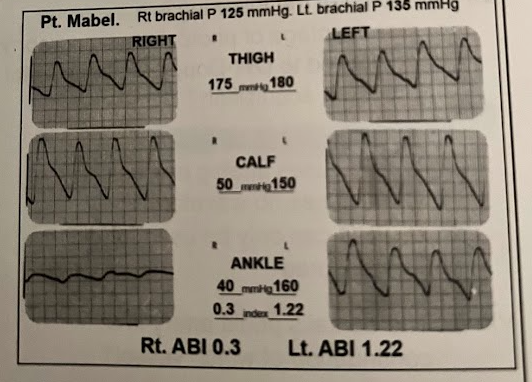
A 3-cuff PVR and pressure study was performed on this diabetic patient. Normal pulses were palpated to the popliteal levels, no pulses were detected on the right PTA or DPA. What is the disease level on the right?
Severe tibial disease
The gastrocnemius veins drain into what deep veins?
Popliteal vein
Which of the following does not contribute to chronic venous insufficiency
Stasis dermatitis
True/False: Normal flow direction in the perforating veins of the lower extremities is from the deep to superficial veins
False
What paired veins lie closest to the fibula
Peroneal
What is the name for the perforating veins found in the medial side of the mid to lower calf?
Cockett’s
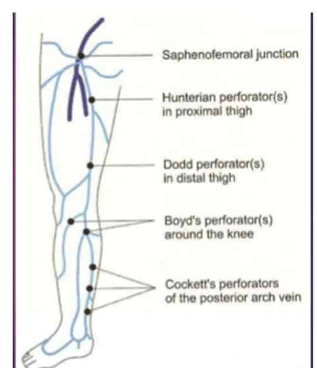
Return blood flow from the legs decreases during inspiration due to which of the following?
Increase in intra-abdominal pressure
Pulsatile flow in the popliteal veins, bilateral, may be a sign of which of the following conditions?
Congestive heart failure
What is the main impediment to blood return from the legs to the heart when sitting?
Hydrostatic pressure
The vein of Giacomini courses between what two vein segments?
Small saphenous to great saphenous
The calf muscle veins that drain into the posterior tibial or peroneal veins are known as?
Soleal veins
The small saphenous vein is usually drains into which of the following veins?
Popliteal
What is the tributary of the great saphenous vein that draining the antero-lateral aspect of the thigh?
Anterior accessory great saphenous vein
A symptom of chronic venous insufficiency in which the patient experiences a burning sensation, “heaviness” and pain in the legs during exercise is called:
Venous claudication
A venous Doppler exam of the popliteal vein reveals a sustained flow signal upon release of distal compression. This would indicate which of the following?
Venous reflux
Components of Virchow’s triad include which of the following?
Circulatory stasis, hypercoagulability, and intimal injury
Continuous, non-phasic venous flow unilaterally in a common femoral vein suggests which of the following?
Iliac vein obstruction
What is another name for an abnormal popliteal structure containing synovial fluid?
Baker’s cyst
True/False: The presence of respiratory variation in the femoral vein r/o DVT in the ipsilateral popliteal vein.
False
A condition resulting in a grossly swollen and cyanotic leg that is caused by iliofemoral venous thrombosis is known as:
Phlegmasia cerulea dolens
In addition to incompetent valves, which of the following is a cause of venous insufficiency?
Chronic venous outflow obstruction
Which of the following describes the anatomical position of the popliteal vein compared to the popliteal artery?
It lies posterior to the artery
Thrombosis of the left common iliac vein by extrinsic compression of the right iliac artery is known as:
May-Thurner Syndrome
Why is Doppler angle correlation not necessary in venous imaging?
Velocity calculation is not necessary
Which of the following is a kidney-shaped structure sometimes imaged in the groin region?
Lymph node
If thrombus is found in this vein it can extend into popliteal vein where it can embolize?
Gastrocnemius vein
Ture/False: If for some reason you must perform a lower arterial physiologic exam and a venous exam on the same pt, you should perform the arterial exam first
False
True/False: A negative D-dimer test usually r/o the presence of acute DVT.
True
What is the name of the perforating veins located in the upper thigh?
Hunterians
Incompetence in this valve often leads to entire GSV being incompetent
Terminal valve
With the pt standing, what time value is the threshold between normal and abnormal reflux in the deep vein?
1 second
Perforating veins exceeded this diameter have a higher predictive value for being incompetent
>3.5mm
Which of the following best describes primary venous insufficiency
Insufficiency caused by congenital absence of valves
True/False: To assess venous reflux, the Valsalva maneuver is suitable for the GSV, Prox-Mid SFV, CFV
True
Perforating veins should be evaluated with the pt in which position
sitting, leg dependent
True/False: Reflux flow in the CFV during valsalva always indicates deep vein incompetence
False
What is the abnormal reflux time for a PPG venous insufficiency test?
<20 seconds
During inspiration, what conditions listed below occurs in the upper extremity veins?
Intra-thoracic pressure is decreased, causing an increase in flow
The cephalic and basilic veins are connected distally by which of the following veins?
Median cubital
The innominate vein is formed by the confluence of what two veins?
Internal jugular and subclavian
Which of the following is a sign of normalcy in a subclavian vein that is usually not present in the lower extremity veins?
Prominent cardiac pulsatility
True/False: Similar to upper arterial system, the central upper venous system has one brachiocephalic vein
False
Retrograde flow in the internal jugular vein indicates which of the following conditions?
Ipsilateral brachiocephalic obstruction
Compression of the subclavian veins that results in thrombosis is called:
Paget-Schroetter syndrome
What is the best ultrasound method for assessing the upper central veins
Spectral Doppler flow pattern assessment
True/False: The brachial vein is the largest vein in the arm.
False